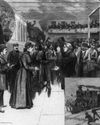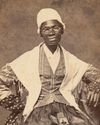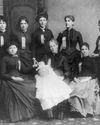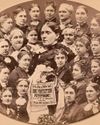Versuchen GOLD - Frei
Preparing To Fight
Cobblestone American History Magazine for Kids
|May/June 2017
When the United States declared war on Germany on April 6, 1917, the decision triggered a massive effort to organize, train, and supply U.S. forces for duty overseas.

Hearing that America had declared war, British prime minister David Lloyd George praised Americans’ resourcefulness and ability to get things done. But he was mistaken about how soon U.S. forces could help. He criticized a top German general who predicted that the United States would need a year before it arrived in Europe in force. But the general was right—it was spring 1918 before the majority of U.S. troops landed in France.
Almost immediately after declaring war, President Woodrow Wilson said a half million men would have to join the armed forces. He added that the country would ask for many more soldiers “as they may be needed and can be handled in training.”
In June 1917, General John J. “Black Jack” Pershing, commander in chief of the American Expeditionary Force (AEF), went to Britain and France. He advised the U.S. War Department to send over “at least 1,000,000 men by next May.” At the time, the Allies had 3.5 million men on the Western Front, more than the Germans. But they were tired and discouraged from several years of fighting.
The U.S. military, however, was just not ready. The regular army had no more than 100,000 men. Those men were not prepared for modern warfare. The conflict going on in Europe involved trenches, poison gas attacks, and shelling with high explosives. Soldiers needed to be trained to fight in a type of war that America had never before faced.
A strong effort was made to gather and train men. Recruits, consisting of National Guard and Army personnel, volunteers, and
Diese Geschichte stammt aus der May/June 2017-Ausgabe von Cobblestone American History Magazine for Kids.
Abonnieren Sie Magzter GOLD, um auf Tausende kuratierter Premium-Geschichten und über 9.000 Zeitschriften und Zeitungen zuzugreifen.
Sie sind bereits Abonnent? Anmelden
WEITERE GESCHICHTEN VON Cobblestone American History Magazine for Kids

Cobblestone American History Magazine for Kids
nellie Bly Journalist
nellie Bly's first newspaper articles appeared in print when she was just 20 years old.
2 mins
Cobblestone February 2025: Women Trailblazers of the 1800s

Cobblestone American History Magazine for Kids
Arabella Mansfield -Lawyer
Arabella Mansfield started out life as Belle Babb (1846-1911). She grew up in a Midwest family that valued education. In 1850, her father left to search for gold in California. He died in a tunnel accident a few years later.
2 mins
Cobblestone February 2025: Women Trailblazers of the 1800s

Cobblestone American History Magazine for Kids
Sarah Josepha Hale Editor
Long before Vogue or Glamour caught women's attention, Godey's Lady's Book introduced the latest fashions.
3 mins
Cobblestone February 2025: Women Trailblazers of the 1800s

Cobblestone American History Magazine for Kids
Louise Blanchard Bethune - Architect
Louise Blanchard Bethune (1856-1915) showed early promise in math. Lucky for her, her father was the principal and a mathematics teacher in a school in Waterloo, New York. Instead of going to school, Louise's father taught her at home until she was 11 years old. She also discovered a skill for planning houses. It developed into a lifelong interest in architecture and a place in history as the first professional female architect in the United States.
2 mins
Cobblestone February 2025: Women Trailblazers of the 1800s

Cobblestone American History Magazine for Kids
Sojourner Truth Speaker
There was a time when slavery wastes abolished the institution over a number of decades. New York abolished slavery in 1827. Isabella Baumfree (c. 1797-1883) was born enslaved in Hurley, New York. When she was nine, she was taken from her parents and sold. She then was sold several more times. Some of her owners were cruel and abused her. During that time, she had several children.
1 mins
Cobblestone February 2025: Women Trailblazers of the 1800s

Cobblestone American History Magazine for Kids
Getting Started
In this editorial cartoon, a young 19th-century woman must overcome the obstacle of carrying a heavy burden while climbing a multirung ladder before she can achieve \"Equal Suffrage.\"
2 mins
Cobblestone February 2025: Women Trailblazers of the 1800s

Cobblestone American History Magazine for Kids
Leonora M. Barry - Investigator
When Leonora M. Barry (1849-1923) was a young girl, her family left Ireland to escape a famine. They settled in New York. Barry became a teacher. In 1872, she married a fellow Irish immigrant. At that time, married women were not allowed to work. So, Barry stayed home to raise their three children.
2 mins
Cobblestone February 2025: Women Trailblazers of the 1800s

Cobblestone American History Magazine for Kids
Finding a New Path
For many Americans, this month's mystery hero represents the ultimate modern trailblazer. She is recognized by just her first name.
1 min
Cobblestone February 2025: Women Trailblazers of the 1800s

Cobblestone American History Magazine for Kids
The Grimké Sisters Abolitionists
Every night, Dinah was supposed to brush the E hair of her mistress, Sarah Moore Grimké (1792-1873). But one night, 12-year-old Sarah stopped Dinah. She wanted to help Dinah instead. They had to be quiet so they wouldn't get caught. It was 1804 in Charleston, South Carolina. The Grimkés were among Charleston's major slaveholding families. Strict laws regulated the behavior of both master and enslaved people.
4 mins
Cobblestone February 2025: Women Trailblazers of the 1800s

Cobblestone American History Magazine for Kids
Frances Willard Leader
During Frances Willard's lifetime (1839-1898), she was the best-known woman in America: She headed the largest women's organization in the worldthe Woman's Christian Temperance Union (WCTU). In that role, her abilities shone as a social activist, a dynamic speaker, and a brilliant organizer. She educated women on how to run meetings, write petitions, give speeches, and lobby state and federal legislators.
2 mins
Cobblestone February 2025: Women Trailblazers of the 1800s
Translate
Change font size

